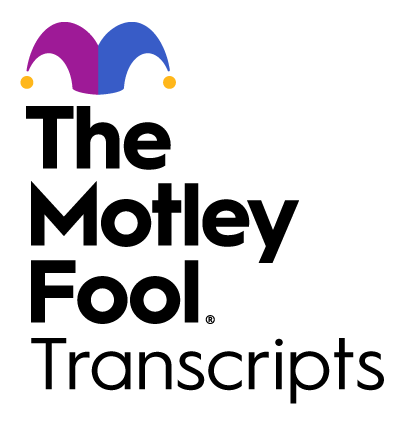Universal Insurance (UVE) Q2 2025 Earnings Call Transcript

Image source: The Motley Fool.
Date
Friday, July 25, 2025, at 10 a.m. ET
Call participants
- Chief Executive Officer — Steve Donaghy
- Chief Financial Officer — Frank Wilcox
Need a quote from one of our analysts? Email pr@fool.com
Takeaways
- Adjusted return on common equity—29.4% for Q2 2025, reflecting favorable underwriting trends.
- Adjusted diluted EPS—$1.23 for Q2 2025, an increase from $1.18 in the prior-year quarter, due to higher direct premiums earned, net investment income, and commission revenue, partially offset by a higher ceded premium ratio.
- Core revenue— $400.9 million, up 5.7% year over year, driven by higher net premiums earned, net investment income, and commission revenue.
- Direct premiums written—$596.7 million, up 3.2% year over year.
- Direct premiums earned—$523.4 million, up 6.7% year over year, reflecting growth in direct premiums written over the previous 12 months.
- Net premiums earned—$360.2 million for Q2 2025, an increase of 4.4%, mainly from higher direct premiums earned, partially offset by a higher ceded premium ratio.
- Net combined ratio—97.8% for Q2 2025, up 1.9 percentage points, due to higher net loss and expense ratios.
- Net expense ratio—72.3%, up 1.7 points, primarily driven by a higher ceded premium ratio and increased policy acquisition costs from growth outside Florida, partially offset by economies of scale.
- Share repurchases—Approximately 287,000 shares were repurchased in Q2 2025 at an aggregate cost of $7.4 million. $15.2 million remains under the current repurchase authorization.
- Dividend declaration—Quarterly cash dividend of $0.16 per share declared on July 9, 2025, payable August 8, 2025, to shareholders of record as of August 1, 2025.
- Market environment—Steve Donaghy noted the presence of more competitors in Florida but stated, "we don't see anybody with a real hungry appetite from a competitive perspective across the state."
- Prior year development—Frank Wilcox said, "It was negligible, Nick. Nothing to really speak of," regarding any prior period reserve development or claims handling benefits.
Summary
Universal Insurance (NYSE:UVE) reported performance attributed to higher premiums and investment income offset by a higher ceded premium ratio. Geographic diversification continued, with 25.4% premium growth outside Florida and a 2.5% decline in Florida, highlighting improvements in the Florida market. Ongoing share repurchases and a dividend declaration affirmed active capital management policy.
- Frank Wilcox described holding company capital as "abundant" and indicated willingness to continue share repurchases when shares are perceived as undervalued.
- Steve Donaghy emphasized disciplined underwriting, stating decisions are "not driven by the competition" but guided by experience and profitability in targeted geographies.
- No material prior period development impacted quarterly results, according to management commentary.
- Reinsurance program transitions influenced comparative results, as the prior year quarter (Q2 2024) included months from a less expensive legacy program structure.
Industry glossary
- Ceded premium ratio: The percentage of premiums transferred by an insurer to reinsurers, indicating the extent of risk transfer off the primary company’s books.
- Net combined ratio: The sum of an insurer's net loss and net expense ratios, measuring underwriting profitability before investment income.
Full Conference Call Transcript
Steve Donaghy: Thanks, Arash. Morning, everyone. In the quarter, we delivered a very strong 29.4% adjusted return on common equity. We are encouraged by favorable underwriting trends as the Florida market continues to improve, and we are optimistic as we look ahead. I'll turn it over to Frank to walk through our financial results. Frank?
Frank Wilcox: Thanks, Steve. Good morning. Adjusted diluted earnings per common share was $1.23 compared to adjusted diluted earnings per common share of $1.18 in the prior year quarter. The higher adjusted diluted earnings per common share mostly stems from higher direct premiums earned, net investment income, and commission revenue, partially offset by a higher ceded premium ratio. Core revenue of $400.9 million was up 5.7% year over year, with growth primarily stemming from higher net premiums earned, net investment income, and commission revenue. Direct premiums written were $596.7 million, up 3.2% from the prior year quarter. The increase stems from 25.4% growth in other states, partially offset by a 2.5% decrease in Florida.
Overall growth mostly reflects higher policies in force, higher rates, and inflation adjustments across our multistate footprint. Direct premiums earned were $523.4 million, up 6.7% from the prior year quarter, reflecting direct premiums written growth over the last twelve months. Net premiums earned were $360.2 million, up 4.4% from the prior year quarter. The increase is primarily attributable to higher direct premiums earned, partially offset by a higher ceded premium ratio as described above. The net combined ratio was 97.8%, up 1.9 points compared to the prior year quarter. The increase reflects higher net loss and expense ratios.
The 72.3% net loss ratio was up 1.7 points compared to the prior year quarter, with the increase primarily reflecting a higher ceded premium ratio. The net expense was 25.5%, up 0.2 points compared to the prior year quarter, with the increase primarily driven by a higher ceded premium ratio and higher policy acquisition costs associated with growth outside of Florida, partially offset by economies of scale. During the second quarter, the company repurchased approximately 287,000 shares at an aggregate cost of $7.4 million. The company's current share repurchase authorization program has approximately $15.2 million remaining.
On July 9, 2025, the board of directors declared a quarterly cash dividend of 16¢ per common share payable on August 8, 2025, to shareholders of record as of the close of business on August 1, 2025. With that, I'd like to ask the operator to open the line for questions.
Operator: Thank you. And wait for your name to be announced. To withdraw your question, please press 11 again. One moment for questions. Our first question comes from Paul Newsome with Piper Sandler. You may proceed.
Paul Newsome: Good morning. Can you give us a little bit more about the reinsurance seating change and what's going on there? Just it's the driver's.
Frank Wilcox: Morning, Paul. So you have to appreciate that when you're comping over this particular quarter, you're looking at several different reinsurance programs that are earning in. Last year, the first two months, April and May, we were still earning in a program that included the wrap program, which was at no cost and that was much lower than you know, the cost to replace that. So this year, April and May, was last year's program winding up plus the first month of this year's program. So it's really just comping off a different structured program.
Paul Newsome: Different question. You bought back some shares. Recently, maybe a review of kinda where you think you are from a capital perspective. Including kinda how you think about how we should measure it as an outside?
Frank Wilcox: Well, capital as a holding company is abundant. Naturally, we take opportunities to purchase shares when we believe that they're undervalued. We continue to do so when appropriate.
Paul Newsome: Okay. And then just a few thoughts on the normally competitive environment. There are concerns, I think, that we're seeing some companies that maybe not just so new, but some companies becoming more competitive in the environment, particularly in Florida, but maybe elsewhere as well. Do you think it's an incrementally more competitive market today than it was last quarter or the quarter before?
Steve Donaghy: Hey, Paul. This is Steve. Good morning. I wouldn't say that it's a more competitive market, you know, and we are not driven by the competition. We are driven by, you know, twenty-five years of experience in Florida, and as we've expanded into other states, you know, we use our boots on the ground, our claims experience, etcetera. To really assess and understand where we wanna write business and where it can be the most profitable for our shareholders. And I would say that, you know, we've recently opened up additional territories in Florida. And feel good about the business that we're bringing in at this time across the state.
So but, you know, clearly, there are more competitors in Florida as well than there was a year ago or a quarter ago. But we don't see anybody with a real hungry appetite from a competitive perspective across the state. We see pockets of competition in Florida, but nothing dramatic across the entire state.
Paul Newsome: Appreciate the help. I'll let some other folks ask questions, but thank you.
Steve Donaghy: Thanks, Paul. Have a good day.
Operator: Thank you. Our next question comes from Nicolas Iacoviello with Dowling and Partners. You may proceed.
Nicolas Iacoviello: Was there any prior development or claims handling benefits in the quarter? I'm assuming no, but just wanted to confirm.
Frank Wilcox: It was negligible, Nick. Nothing to really speak of.
Nicolas Iacoviello: Okay. Great. And then just on the new reinsurance program, so I know we have one month of ceded premiums now with this Q2 result, but could you discuss the cost which wasn't disclosed this year, maybe as a percentage of direct earned premium? As you've done in years prior?
Frank Wilcox: The cost year over year, this program that went into effect June 1, is not significantly different than what the cost was as a percentage of direct earned premium for the previous period. Which we're very pleased with naturally given the fact that we had three landfalling storms last year, which typically following those events, the price would go up significantly. And that's certainly an indication of the improvement in the Florida marketplace.
Nicolas Iacoviello: Great. That's all I had. Thank you.
Frank Wilcox: Yep. Thanks, Nick.
Operator: Thank you. I would now like to turn the call back over to Steve Donaghy for any closing remarks.
Steve Donaghy: Thank you. I'd like to thank all of our associates, consumers, agents, and our stakeholders for their continued support of Universal Insurance Holdings, Inc. Have a good day.
Operator: This concludes the conference. Thank you for your participation. You may now disconnect.
Where to invest $1,000 right now
When our analyst team has a stock tip, it can pay to listen. After all, Stock Advisor’s total average return is 1,026%* — a market-crushing outperformance compared to 180% for the S&P 500.
They just revealed what they believe are the 10 best stocks for investors to buy right now, available when you join Stock Advisor.
See the stocks »
*Stock Advisor returns as of August 4, 2025
This article is a transcript of this conference call produced for The Motley Fool. While we strive for our Foolish Best, there may be errors, omissions, or inaccuracies in this transcript. Parts of this article were created using Large Language Models (LLMs) based on The Motley Fool's insights and investing approach. It has been reviewed by our AI quality control systems. Since LLMs cannot (currently) own stocks, it has no positions in any of the stocks mentioned. As with all our articles, The Motley Fool does not assume any responsibility for your use of this content, and we strongly encourage you to do your own research, including listening to the call yourself and reading the company's SEC filings. Please see our Terms and Conditions for additional details, including our Obligatory Capitalized Disclaimers of Liability.
The Motley Fool has no position in any of the stocks mentioned. The Motley Fool has a disclosure policy.



